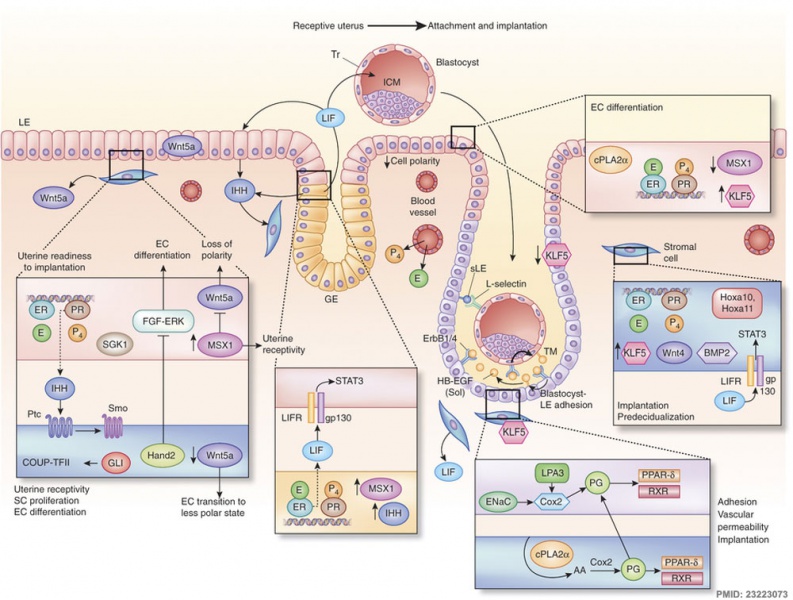File:Implantation cartoon 01.jpg

Original file (1,000 × 756 pixels, file size: 154 KB, MIME type: image/jpeg)
Molecular Implantation Cartoon
| Compartment colours | |
|---|---|
| This is a hybrid cartoon, based on mouse and human studies, portraying compartment- and cell-type–specific expression of molecules and their potential functions necessary for uterine receptivity, implantation and decidualization. Interplay of ovarian P4- and/or E2-dependent and P4- and/or E2-independent factors in the pregnant uterus in specific compartments contributes to the success of implantation in a juxtacrine/paracrine/autocrine manner. During attachment, interactions between the blastocyst and luminal epithelium (LE) involve ErbB1/4 (blue) and both transmembrane (TM) and soluble (Sol) forms of HB-EGF, as well as L-selectin ligands (sLE) expressed by the luminal epithelium to L-selectin receptors on the blastocyst. The other key signaling pathways for uterine receptivity and implantation are also shown. |
|
| Legend | |||
|---|---|---|---|
|
|
|
|
- Links: Implantation
Reference
Cha J, Sun X & Dey SK. (2012). Mechanisms of implantation: strategies for successful pregnancy. Nat. Med. , 18, 1754-67. PMID: 23223073 DOI.
Copyright
Reprinted by permission from Macmillan Publishers Ltd: Nature Medicine (Mechanisms of implantation: strategies for successful pregnancy. Cha J, Sun X, Dey SK. Nat Med. 2012 Dec;18(12):1754-67. doi: 10.1038/nm.3012. Review. PMID 23223073), copyright (2012)
Nm.3012-F1.jpg
Cite this page: Hill, M.A. (2024, April 19) Embryology Implantation cartoon 01.jpg. Retrieved from https://embryology.med.unsw.edu.au/embryology/index.php/File:Implantation_cartoon_01.jpg
- © Dr Mark Hill 2024, UNSW Embryology ISBN: 978 0 7334 2609 4 - UNSW CRICOS Provider Code No. 00098G
File history
Click on a date/time to view the file as it appeared at that time.
| Date/Time | Thumbnail | Dimensions | User | Comment | |
|---|---|---|---|---|---|
| current | 17:46, 18 March 2013 |  | 1,000 × 756 (154 KB) | Z8600021 (talk | contribs) | This is a hybrid cartoon, based on mouse and human studies, portraying compartment- and cell-type–specific expression of molecules and their potential functions necessary for uterine receptivity, implantation and decidualization. Interplay of ovarian... |
You cannot overwrite this file.
File usage
The following 4 pages use this file: